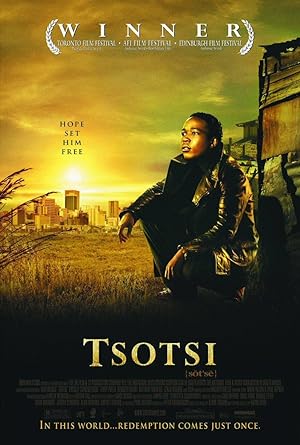I heard about Tsotsi from a South African friend who was swelling with pride over the Oscar nomination so it ended up in my queue. Tsotsi is about a criminal who winds up in an unexpected predicament that awakens an exploration into his conscience and his past.
On one hand, Tsotsi is a well-crafted film. Tsotsi does an effective job of making Tsotsi seem completely menacing and emotionally bankrupt so a viewer reads even his casual comments as threatening, but as the story reveals his past in flashbacks, Tsotsi rewards the attentive viewer with the deeper meaning behind his comments. He keeps returning to the scene of the crime as if he is struggling with the prior unexpected revelation in his character. For his victims, he is like an unwanted curse that can’t be lifted, and they must feel like Job. For him, each visit leads to seismic changes in his character.
On the other hand, plenty of people have disastrous, horrific childhoods, and they are not as emotionally or psychologically bankrupt as our titular character. Tsotsi reminded me of Slavoj Zizek’s analysis of West Side Story’s Gee, Officer Krupke song in The Pervert’s Guide to Ideology. Tsotsi may have had a messy journey, but his awakening seems a bit tidy.
I believe in redemption and salvation, but the awakening of Tsotsi’s humanity seemed unlikely due to the unexpected responsibility. Usually people’s worst selves emerge and relationships crumble in the face of a similar challenge.
Stay In The Know
Join my mailing list to get updates about recent reviews, upcoming speaking engagements, and film news.





